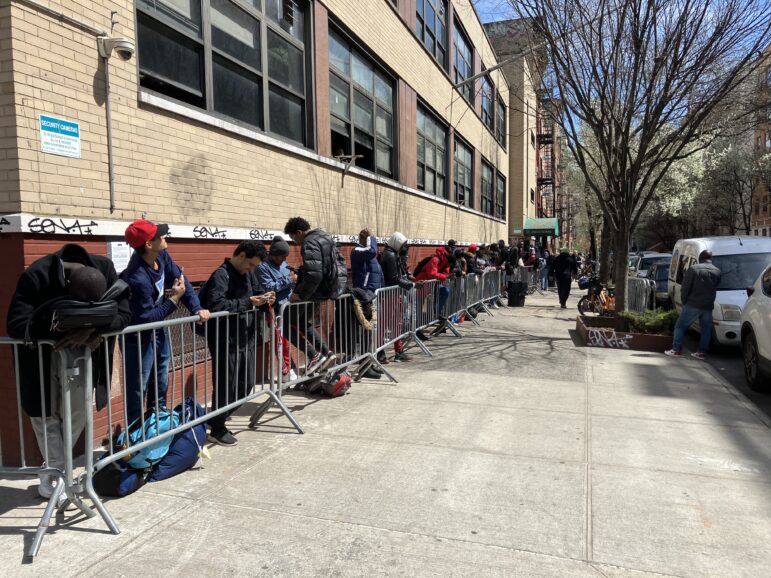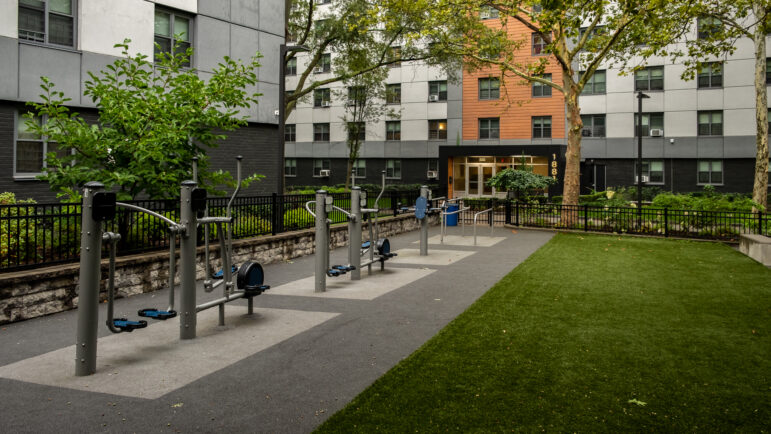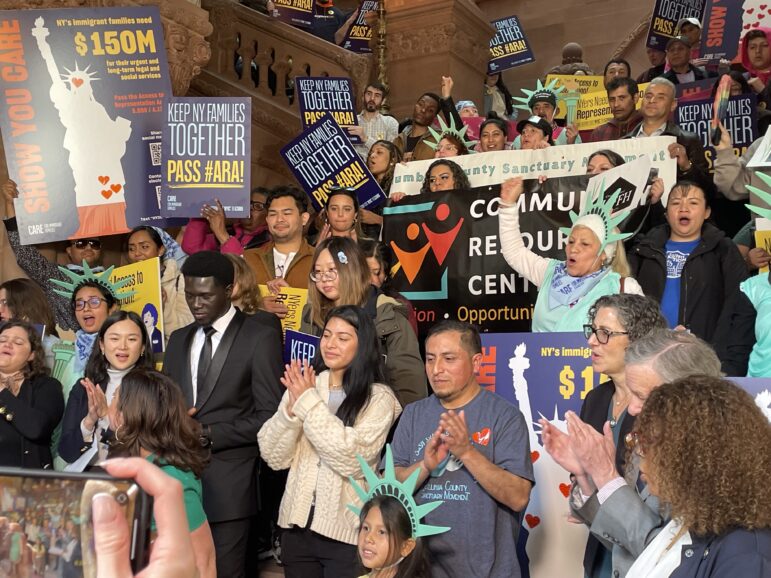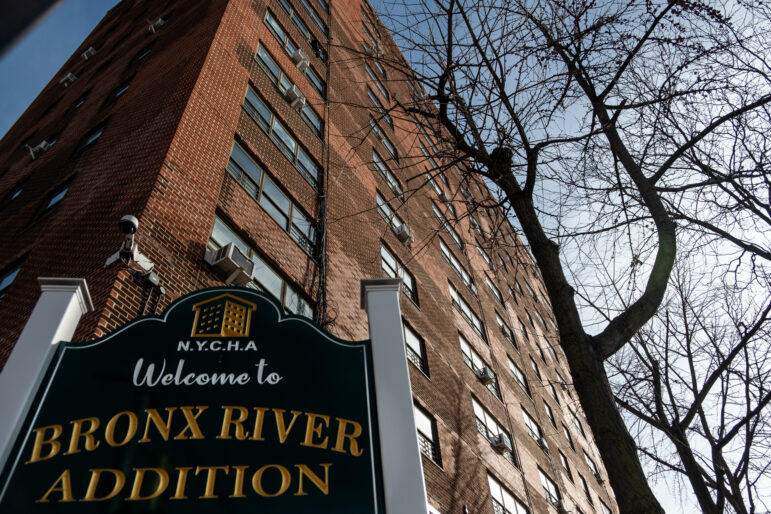Inna Stavitsky pulled the lever for a Brighton Beach state legislator in 1998, it was the first time she’d voted in almost 15 years. She had just become a U.S. citizen, after years of navigating red tape at the Immigration and Naturalization Service as a refugee from St. Petersburg. Before that, while still in the former Soviet Union, she and her husband sat out election after election before emigrating in 1989. “It was meaningless,” she says of the political process there. Typically, there was just one candidate per seat, always running on the same party line–Communist, of course.
Since then, Stavitsky’s perspective on politics has changed. In New York, she became an advocate for Russian emigres, then director of the Brooklyn Refugee Project in Brighton Beach. For more than a decade she has watched her congressmen successfully prod the Immigration and Naturalization Service to expedite her clients’ citizenship cases. “An immigrant can do nothing wrong, apply on time, follow all the rules…and suddenly their cases get lost, and no one can explain the process,” she says. “I decided that I need to become an elected official in order to help.” Stavitsky is running for the neighborhood’s vacant City Council seat.
As a councilmember she could mostly steer city dollars to favored projects, and perhaps secure more translators for schools and hospitals. But for Brighton Beach, the elections could be something powerful indeed. If Stavitsky or one of two other Russians likely to run this fall wins, he or she will be the first Russian immigrant to hold office in the U.S.
In a field of 10 candidates, including the wife of current Councilmember Howard Lasher [see “Block Association”] and allies of Assemblymember Adele Cohen and Congressman Anthony Weiner, that remains unlikely. Most Russian-Americans have yet to experience Stavitsky’s awakening to the power of elected office. “Politics are new to Russians,” explains Vladimir Epstein, director of the Russian-American Voter Education League. “They don’t understand the importance of elections. They do not understand that something depends on them.”
But in the past few years, lots of Russians have come face-to-face with American government, and haven’t necessarily liked what they see. Many refugees depend on welfare, SSI or Medicare, and difficulties with keeping cases open abound. The year of welfare reform was also a watershed for the community’s political life: In 1996, Stavitsky became the founding director of the Brooklyn Refugee Project, and Epstein founded the voters’ league, which promotes citizen education. “It came to my mind that politicians are not stupid,” says Epstein. “They listen to those who can vote.”
The numbers have certainly grown louder: Since 1990, about 17 percent of the estimated 100,000 Russian U.S. citizens living in Brighton Beach have registered to vote, says Epstein. About 60 percent have signed up as Democrats.
But it’s the number who choose not to sign up for any political party at all that suggests how tough the going will be for Russians seeking office. A recent study by the Research Institute for New Americans shows that 34 percent of Russian Jewish immigrants in the metropolitan area, most of whom live in Brooklyn, say they are registered as independents. That means they cannot vote in primary elections, where most races in the city are effectively decided.
Many have no idea of the consequences of their decision not to register a party affiliation. Last September, when a Russian immigrant named Alec Brook-Krasny ran for state Assembly in the Democratic primary, long lines at the polls in Brighton Beach nearly broke into riots because many Russians were told they were not eligible to vote. In many cases, it was because they had not selected a party affiliation when they registered.
“I hope people have learned their lesson,” says Inna Arolovich, chair of the New York chapter of the American Association of Jews from the Former Soviet Union, which, with Epstein’s group, registered about 2,000 Russians last year. She and her colleagues have testified before the City Council for more Russian-speaking staff at polling sites, and this year they plan to paper the neighborhood with flyers and how-to booklets on everything from filling out registration forms to pulling the levers.
But politics in New York are never that simple. Brook-Krasny had to run as a write-in candidate after a judge found he had forged signatures on his petitions. Some of his supporters say opponent Adele Cohen orchestrated the ballot dispute. “Cohen is a mastermind of court challenges,” says Arkady Kagan, an editor of the Russian Forward, which is closely covering this year’s race and encouraging readers to register and vote. Kagan predicts Cohen and her candidate, Dominic Recchia, will also challenge Stavitsky’s petitions. (Cohen says she finds that ridiculous: “Anybody who follows the rules will never lose a ballot position,” she says.)
Stavitsky’s $3,000 campaign account has been funded mostly through tiny contributions from retirees. Politically, she couldn’t be more different from Oleg Gutnik, a Sheepshead Bay gynecologist vying for the Republican nomination. Since emigrating from the Ukraine in 1980, Gutnik has made himself a friend to the Republican Party, contributing thousands to its committees and candidates, and in return receiving appointments to the board of the Brooklyn Public Library and Gov. George Pataki’s Citizenship Unit. Brook-Krasny, who owns Coney Island’s Fun-o-Rama and is a member of Community Board 13, is reportedly helping Gutnik with his campaign, but rumors abound that he, too, may run for Council.
Despite his skepticism, Kagan says he will do what he can to get people to the polls. “I tell everyone to register Democrat,” says Kagan, who guesses that based on last fall’s turnout–Brook-Krasny managed to get about 1,300 write-in votes–at least 15,000 Russian Democrats will vote in the Brighton Beach primaries. “We want official recognition that we exist.”








